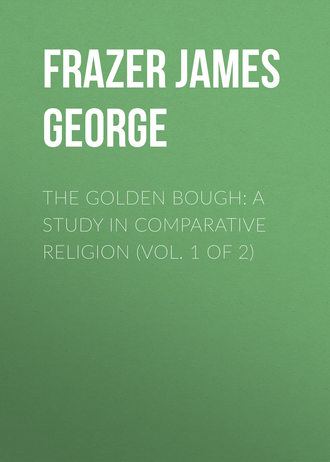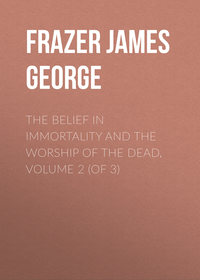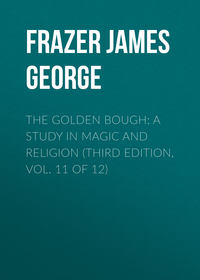
The Golden Bough: A Study in Comparative Religion (Vol. 1 of 2)
Sometimes the severed hair and nails are preserved, not to prevent them from falling into the hands of a magician, but that the owner may have them at the resurrection of the body, to which some races look forward. Thus the Incas of Peru “took extreme care to preserve the nail-parings and the hairs that were shorn off or torn out with a comb; placing them in holes or niches in the walls, and if they fell out, any other Indian that saw them picked them up and put them in their places again. I very often asked different Indians, at various times, why they did this, in order to see what they would say, and they all replied in the same words, saying, ‘Know that all persons who are born must return to life’ (they have no word to express resuscitation), ‘and the souls must rise out of their tombs with all that belonged to their bodies. We, therefore, in order that we may not have to search for our hair and nails at a time when there will be much hurry and confusion, place them in one place, that they may be brought together more conveniently, and, whenever it is possible, we are also careful to spit in one place.’ ”732 In Chile this custom of stuffing the shorn hair into holes in the wall is still observed, it being thought the height of imprudence to throw the hair away.733 Similarly the Turks never throw away the parings of their nails, but carefully keep them in cracks of the walls or of the boards, in the belief that they will be needed at the resurrection.734 Some of the Esthonians keep the parings of their finger and toe nails in their bosom, in order to have them at hand when they are asked for them at the day of judgment.735 The Fors of Central Africa object to cut any one else's nails, for should the part cut off be lost and not delivered into its owner's hands, it will have to be made up to him somehow or other after death. The parings are buried in the ground.736 To spit upon the hair before throwing it away is thought in some parts of Europe sufficient to prevent its being used by witches.737 Spitting as a protective charm is well known.
Some people burn their loose hair to save it from falling into the power of sorcerers. This is done by the Patagonians and some of the Victorian tribes.738 The Makololo of South Africa either burn it or bury it secretly,739 and the same alternative is sometimes adopted by the Tirolese.740 Cut and combed out hair is burned in Pomerania and sometimes at Liége.741 In Norway the parings of nails are either burned or buried, lest the elves or the Finns should find them and make them into bullets wherewith to shoot the cattle.742 This destruction of the hair or nails plainly involves an inconsistency of thought. The object of the destruction is avowedly to prevent these severed portions of the body from being used by sorcerers. But the possibility of their being so used depends upon the supposed sympathetic connection between them and the man from whom they were severed. And if this sympathetic connection still exists, clearly these severed portions cannot be destroyed without injury to the man.
Before leaving this subject, on which I have perhaps dwelt too long, it may be well to call attention to the motive assigned for cutting a young child's hair in Roti.743 In that island the first hair is regarded as a danger to the child, and its removal is intended to avert the danger. The reason of this may be that as a young child is almost universally supposed to be in a tabooed or dangerous state, it is necessary, in removing the taboo, to destroy the separable parts of the child's body on the ground that they are infected, so to say, by the virus of the taboo and as such are dangerous. The cutting of the child's hair would thus be exactly parallel to the destruction of the vessels which have been used by a tabooed person.744 This view is borne out by a practice, observed by some Australians, of burning off part of a woman's hair after childbirth as well as burning every vessel which has been used by her during her seclusion.745 Here the burning of the woman's hair seems plainly intended to serve the same purpose as the burning of the vessels used by her; and as the vessels are burned because they are believed to be tainted with a dangerous infection, so, we must suppose, is also the hair. We can, therefore, understand the importance attached by many peoples to the first cutting of a child's hair and the elaborate ceremonies by which the operation is accompanied.746 Again, we can understand why a man should poll his head after a journey.747 For we have seen that a traveller is often believed to contract a dangerous infection from strangers and that, therefore, on his return home he is obliged to submit to various purificatory ceremonies before he is allowed to mingle freely with his own people.748 On my hypothesis the polling of the hair is simply one of these purificatory or disinfectant ceremonies. The cutting of the hair after a vow may have the same meaning. It is a way of ridding the man of what has been infected by the dangerous state of taboo, sanctity, or uncleanness (for all these are only different expressions for the same primitive conception) under which he laboured during the continuance of the vow. Similarly at some Hindu places of pilgrimage on the banks of rivers men who have committed great crimes or are troubled by uneasy consciences have every hair shaved off by professional barbers before they plunge into the sacred stream, from which “they emerge new creatures, with all the accumulated guilt of a long life effaced.”749
As might have been expected, the superstitions of the savage cluster thick about the subject of food; and he abstains from eating many animals and plants, wholesome enough in themselves, but which for one reason or another he considers would prove dangerous or fatal to the eater. Examples of such abstinence are too familiar and far too numerous to quote. But if the ordinary man is thus deterred by superstitious fear from partaking of various foods, the restraints of this kind which are laid upon sacred or tabooed persons, such as kings and priests, are still more numerous and stringent. We have already seen that the Flamen Dialis was forbidden to eat or even name several plants and animals, and that the flesh diet of the Egyptian kings was restricted to veal and goose.750 The Gangas or fetish priests of the Loango Coast are forbidden to eat or even see a variety of animals and fish, in consequence of which their flesh diet is extremely limited; often they live only on herbs and roots, though they may drink fresh blood.751 The heir to the throne of Loango is forbidden from infancy to eat pork; from early childhood he is interdicted the use of the cola fruit in company; at puberty he is taught by a priest not to partake of fowls except such as he has himself killed and cooked; and so the number of taboos goes on increasing with his years.752 In Fernando Po the king after installation is forbidden to eat cocco (arum acaule), deer, and porcupine, which are the ordinary foods of the people.753 Amongst the Murrams of Manipur (a district of Eastern India, on the border of Burma), “there are many prohibitions in regard to the food, both animal and vegetable, which the chief should eat, and the Murrams say the chief's post must be a very uncomfortable one.”754 To explain the ultimate reason why any particular food is prohibited to a whole tribe or to certain of its members would commonly require a far more intimate knowledge of the history and beliefs of the tribe than we possess. The general motive of such prohibitions is doubtless the same which underlies the whole taboo system, namely, the conservation of the tribe and the individual.
It would be easy to extend the list of royal and priestly taboos, but the above may suffice as specimens. To conclude this part of our subject it only remains to state summarily the general conclusions to which our inquiries have thus far conducted us. We have seen that in savage or barbarous society there are often found men to whom the superstition of their fellows ascribes a controlling influence over the general course of nature. Such men are accordingly adored and treated as gods. Whether these human divinities also hold temporal sway over the lives and fortunes of their fellows, or whether their functions are purely spiritual and supernatural, in other words, whether they are kings as well as gods or only the latter, is a distinction which hardly concerns us here. Their supposed divinity is the essential fact with which we have to deal. In virtue of it they are a pledge and guarantee to their worshippers of the continuance and orderly succession of those physical phenomena upon which mankind depends for subsistence. Naturally, therefore, the life and health of such a god-man are matters of anxious concern to the people whose welfare and even existence are bound up with his; naturally he is constrained by them to conform to such rules as the wit of early man has devised for averting the ills to which flesh is heir, including the last ill, death. These rules, as an examination of them has shown, are nothing but the maxims with which, on the primitive view, every man of common prudence must comply if he would live long in the land. But while in the case of ordinary men the observance of the rules is left to the choice of the individual, in the case of the god-man it is enforced under penalty of dismissal from his high station, or even of death. For his worshippers have far too great a stake in his life to allow him to play fast and loose with it. Therefore all the quaint superstitions, the old-world maxims, the venerable saws which the ingenuity of savage philosophers elaborated long ago, and which old women at chimney corners still impart as treasures of great price to their descendants gathered round the cottage fire on winter evenings – all these antique fancies clustered, all these cobwebs of the brain were spun about the path of the old king, the human god, who, immeshed in them like a fly in the toils of a spider, could hardly stir a limb for the threads of custom, “light as air but strong as links of iron,” that crossing and recrossing each other in an endless maze bound him fast within a network of observances from which death or deposition alone could release him.
To students of the past the life of the old kings and priests thus teems with instruction. In it was summed up all that passed for wisdom when the world was young. It was the perfect pattern after which every man strove to shape his life; a faultless model constructed with rigorous accuracy upon the lines laid down by a barbarous philosophy. Crude and false as that philosophy may seem to us, it would be unjust to deny it the merit of logical consistency. Starting from a conception of the vital principle as a tiny being or soul existing in, but distinct and separable from, the living being, it deduces for the practical guidance of life a system of rules which in general hangs well together and forms a fairly complete and harmonious whole. The flaw – and it is a fatal one – of the system lies not in its reasoning, but in its premises; in its conception of the nature of life, not in any irrelevancy of the conclusions which it draws from that conception. But to stigmatise these premises as ridiculous because we can easily detect their falseness, would be ungrateful as well as unphilosophical. We stand upon the foundation reared by the generations that have gone before, and we can but dimly realise the painful and prolonged efforts which it has cost humanity to struggle up to the point, no very exalted one after all, which we have reached. Our gratitude is due to the nameless and forgotten toilers, whose patient thought and active exertions have largely made us what we are. The amount of new knowledge which one age, certainly which one man, can add to the common store is small, and it argues stupidity or dishonesty, besides ingratitude, to ignore the heap while vaunting the few grains which it may have been our privilege to add to it. There is indeed little danger at present of undervaluing the contributions which modern times and even classical antiquity have made to the general advancement of our race. But when we pass these limits, the case is different. Contempt and ridicule or abhorrence and denunciation are too often the only recognition vouchsafed to the savage and his ways. Yet of the benefactors whom we are bound thankfully to commemorate, many, perhaps most, were savages. For when all is said and done our resemblances to the savage are still far more numerous than our differences from him; and what we have in common with him, and deliberately retain as true and useful, we owe to our savage forefathers who slowly acquired by experience and transmitted to us by inheritance those seemingly fundamental ideas which we are apt to regard as original and intuitive. We are like heirs to a fortune which has been handed down for so many ages that the memory of those who built it up is lost, and its possessors for the time being regard it as having been an original and unalterable possession of their race since the beginning of the world. But reflection and inquiry should satisfy us that to our predecessors we are indebted for much of what we thought most our own, and that their errors were not wilful extravagances or the ravings of insanity, but simply hypotheses, justifiable as such at the time when they were propounded, but which a fuller experience has proved to be inadequate. It is only by the successive testing of hypotheses and rejection of the false that truth is at last elicited. After all, what we call truth is only the hypothesis which is found to work best. Therefore in reviewing the opinions and practices of ruder ages and races we shall do well to look with leniency upon their errors as inevitable slips made in the search for truth, and to give them the benefit of that indulgence which we may one day stand in need of ourselves: cum excusatione itaque veteres audiendi sunt.
Chapter III. Killing The God
“Sed adhuc supersunt aliae superstitiones, quarum secreta pandenda sunt, … ut et in istis profanis religionibus sciatis mortes esse hominum consecratas.” – Firmicus Maternus, De errore profanarum religionum, c. 6.
§ 1. – Killing the divine king
Lacking the idea of eternal duration primitive man naturally supposes the gods to be mortal like himself. The Greenlanders believed that a wind could kill their most powerful god, and that he would certainly die if he touched a dog. When they heard of the Christian God, they kept asking if he never died, and being informed that he did not, they were much surprised and said that he must be a very great god indeed.755 In answer to the inquiries of Colonel Dodge, a North American Indian stated that the world was made by the Great Spirit. Being asked which Great Spirit he meant, the good one or the bad one, “Oh, neither of them” replied he, “the Great Spirit that made the world is dead long ago. He could not possibly have lived as long as this.”756 A tribe in the Philippine Islands told the Spanish conquerors that the grave of the Creator was upon the top of Mount Cabunian.757 Heitsi-eibib, a god or divine hero of the Hottentots, died several times and came to life again. His graves are generally to be met with in narrow passes between mountains.758 The grave of Zeus, the great god of Greece, was shown to visitors in Crete as late as about the beginning of our era.759 The body of Dionysus was buried at Delphi beside the golden statue of Apollo, and his tomb bore the inscription, “Here lies Dionysus dead, the son of Semele.”760 According to one account, Apollo himself was buried at Delphi; for Pythagoras is said to have carved an inscription on his tomb, setting forth how the god had been killed by the python and buried under the tripod.761 Cronus was buried in Sicily,762 and the graves of Hermes, Aphrodite, and Ares were shown in Hermopolis, Cyprus, and Thrace.763
If the great invisible gods are thus supposed to die, it is not to be expected that a god who dwells in the flesh and blood of a man should escape the same fate. Now primitive peoples, as we have seen, sometimes believe that their safety and even that of the world is bound up with the life of one of these god-men or human incarnations of the divinity. Naturally, therefore, they take the utmost care of his life, out of a regard for their own. But no amount of care and precaution will prevent the man-god from growing old and feeble and at last dying. His worshippers have to lay their account with this sad necessity and to meet it as best they can. The danger is a formidable one; for if the course of nature is dependent on the man-god's life, what catastrophes may not be expected from the gradual enfeeblement of his powers and their final extinction in death? There is only one way of averting these dangers. The man-god must be killed as soon as he shows symptoms that his powers are beginning to fail, and his soul must be transferred to a vigorous successor before it has been seriously impaired by the threatened decay. The advantages of thus putting the man-god to death instead of allowing him to die of old age and disease are, to the savage, obvious enough. For if the man-god dies what we call a natural death, it means, according to the savage, that his soul has either voluntarily departed from his body and refuses to return, or more commonly that it has been extracted or at least detained in its wanderings by a demon or sorcerer.764 In any of these cases the soul of the man-god is lost to his worshippers; and with it their prosperity is gone and their very existence endangered. Even if they could arrange to catch the soul of the dying god as it left his lips or his nostrils and so transfer it to a successor, this would not effect their purpose; for, thus dying of disease, his soul would necessarily leave his body in the last stage of weakness and exhaustion, and as such it would continue to drag out a feeble existence in the body to which it might be transferred. Whereas by killing him his worshippers could, in the first place, make sure of catching his soul as it escaped and transferring it to a suitable successor; and, in the second place, by killing him before his natural force was abated, they would secure that the world should not fall into decay with the decay of the man-god. Every purpose, therefore, was answered, and all dangers averted by thus killing the man-god and transferring his soul, while yet at its prime, to a vigorous successor.
Some of the reasons for preferring a violent death to the slow death of old age or disease are obviously as applicable to common men as to the man-god. Thus the Mangaians think that “the spirits of those who die a natural death are excessively feeble and weak, as their bodies were at dissolution; whereas the spirits of those who are slain in battle are strong and vigorous, their bodies not having been reduced by disease.”765 Hence, men sometimes prefer to kill themselves or to be killed before they grow feeble, in order that in the future life their souls may start fresh and vigorous as they left their bodies, instead of decrepit and worn out with age and disease. Thus in Fiji, “self-immolation is by no means rare, and they believe that as they leave this life, so they will remain ever after. This forms a powerful motive to escape from decrepitude, or from a crippled condition, by a voluntary death.”766 Or, as another observer of the Fijians puts it more fully, “the custom of voluntary suicide on the part of the old men, which is among their most extraordinary usages, is also connected with their superstitions respecting a future life. They believe that persons enter upon the delights of their elysium with the same faculties, mental and physical, that they possess at the hour of death, in short, that the spiritual life commences where the corporeal existence terminates. With these views, it is natural that they should desire to pass through this change before their mental and bodily powers are so enfeebled by age as to deprive them of their capacity for enjoyment. To this motive must be added the contempt which attaches to physical weakness among a nation of warriors, and the wrongs and insults which await those who are no longer able to protect themselves. When therefore a man finds his strength declining with the advance of age, and feels that he will soon be unequal to discharge the duties of this life, and to partake in the pleasures of that which is to come, he calls together his relations, and tells them that he is now worn out and useless, that he sees they are all ashamed of him, and that he has determined to be buried.” So on a day appointed they meet and bury him alive.767 In Vaté (New Hebrides) the aged were buried alive at their own request. It was considered a disgrace to the family of an old chief if he was not buried alive.768 Of the Kamants, a Jewish tribe in Abyssinia, it is reported that “they never let a person die a natural death, but if any of their relatives is nearly expiring, the priest of the village is called to cut his throat; if this be omitted, they believe that the departed soul has not entered the mansions of the blessed.”769
But it is with the death of the god-man – the divine king or priest – that we are here especially concerned. The people of Congo believed, as we have seen, that if their pontiff the Chitomé were to die a natural death, the world would perish, and the earth, which he alone sustained by his power and merit, would immediately be annihilated. Accordingly when he fell ill and seemed likely to die, the man who was destined to be his successor entered the pontiff's house with a rope or a club and strangled or clubbed him to death.770 The Ethiopian kings of Meroe were worshipped as gods; but whenever the priests chose, they sent a messenger to the king, ordering him to die, and alleging an oracle of the gods as their authority for the command. This command the kings always obeyed down to the reign of Ergamenes, a contemporary of Ptolemy II, King of Egypt. Having received a Greek education which emancipated him from the superstitions of his countrymen, Ergamenes ventured to disregard the command of the priests, and, entering the Golden Temple with a body of soldiers, put the priests to the sword.771 In the kingdom of Unyoro in Central Africa, custom still requires that as soon as the king falls seriously ill or begins to break up from age, he shall be killed by his own wives; for, according to an old prophecy, the throne will pass away from the dynasty in the event of the king dying a natural death.772 When the king of Kibanga, on the Upper Congo, seems near his end, the sorcerers put a rope round his neck, which they draw gradually tighter till he dies.773 It seems to have been a Zulu custom to put the king to death as soon as he began to have wrinkles or gray hairs. At least this seems implied in the following passage, written by one who resided for some time at the court of the notorious Zulu tyrant Chaka, in the early part of this century: “The extraordinary violence of the king's rage with me was mainly occasioned by that absurd nostrum, the hair oil, with the notion of which Mr. Farewell had impressed him as being a specific for removing all indications of age. From the first moment of his having heard that such a preparation was attainable, he evinced a solicitude to procure it, and on every occasion never forgot to remind us of his anxiety respecting it; more especially on our departure on the mission his injunctions were particularly directed to this object. It will be seen that it is one of the barbarous customs of the Zoolas in their choice or election of their kings that he must neither have wrinkles nor gray hairs, as they are both distinguishing marks of disqualification for becoming a monarch of a warlike people. It is also equally indispensable that their king should never exhibit those proofs of having become unfit and incompetent to reign; it is therefore important that they should conceal these indications so long as they possibly can. Chaka had become greatly apprehensive of the approach of gray hairs; which would at once be the signal for him to prepare to make his exit from this sublunary world, it being always followed by the death of the monarch.”774
The custom of putting kings to death as soon as they suffered from any personal defect prevailed two centuries ago in the Kafir kingdoms of Sofala, to the north of the present Zululand. These kings of Sofala, as we have seen,775 were regarded as gods by their people, being entreated to give rain or sunshine, according as each might be wanted. Nevertheless a slight bodily blemish, such as the loss of a tooth, was considered a sufficient cause for putting one of these god-men to death, as we learn from the following passage of an old historian. “Contiguous to the domains of the Quiteva [the king of the country bordering on the river Sofala], are those of another prince called Sedanda. This prince becoming afflicted with leprosy, resolved on following implicitly the laws of the country, and poisoning himself, conceiving his malady to be incurable, or at least that it would render him so loathsome in the eyes of his people that they would with difficulty recognise him. In consequence he nominated his successor, holding as his opinion that sovereigns who should serve in all things as an example to their people ought to have no defect whatever, even in their persons; that when any defects may chance to befall them they cease to be worthy of life and of governing their dominions; and preferring death in compliance with this law to life, with the reproach of having been its violator. But this law was not observed with equal scrupulosity by one of the Quitevas, who, having lost a tooth and feeling no disposition to follow the practice of his predecessors, published to the people that he had lost a front tooth, in order that when they might behold, they yet might be able to recognise him; declaring at the same time that he was resolved on living and reigning as long as he could, esteeming his existence requisite for the welfare of his subjects. He at the same time loudly condemned the practice of his predecessors, whom he taxed with imprudence, nay, even with madness, for having condemned themselves to death for casual accidents to their persons, confessing plainly that it would be with much regret, even when the course of nature should bring him to his end, that he should submit to die. He observed, moreover, that no reasonable being, much less a monarch, ought to anticipate the scythe of time; and, abrogating this mortal law, he ordained that all his successors, if sane, should follow the precedent he gave, and the new law established by him.”776








